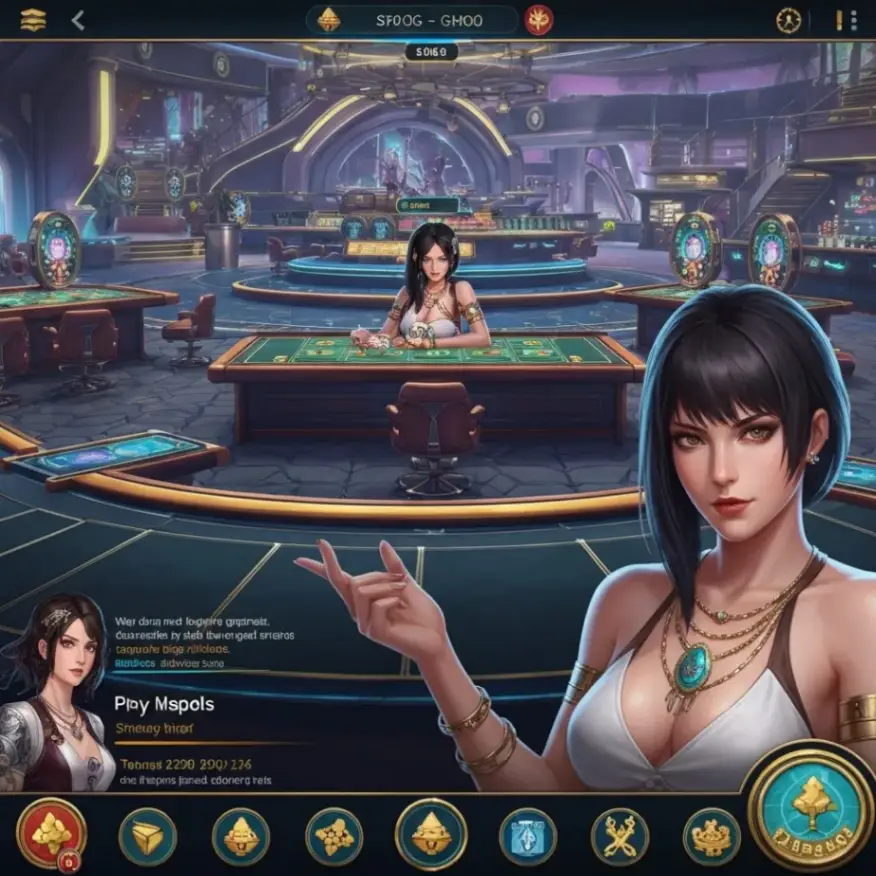Online casinos have long relied on the thrill of chance — spinning reels, flipping cards, and rolling dice have been their foundation for decades. But as the digital entertainment industry evolves, so too does the player’s expectation. It’s no longer enough to simply win or lose; players now want to feel something. That’s where the integration of RPG (Role-Playing Game) elements into online casinos enters the picture. It transforms passive gambling into an active narrative, where every bet and every bonus unfolds as part of a broader journey.
The idea of merging gambling with storytelling was once experimental. Yet, in today’s gaming ecosystem, it’s becoming a growing trend. These hybrid casino platforms blend character progression, quests, and in-game achievements with the mechanics of real-money betting. They allow players to build avatars, unlock storylines, and engage with immersive worlds — all while wagering real stakes. The result is a digital experience that combines the risk of casino gaming with the emotional pull of RPG storytelling.
Why RPG Mechanics Are Changing the Casino Experience
In traditional casinos, the motivation is clear: win money. But in RPG-infused casinos, the incentive system becomes multi-layered. The player’s success is not only measured by monetary gain but also by the progress of their virtual identity. Leveling up, customizing characters, and completing missions bring intrinsic satisfaction, similar to video gaming, while maintaining the rush of gambling.
This approach also helps solve one of the biggest challenges of modern iGaming — retention. Casual players often drop out after a short period, but the addition of narrative layers keeps them emotionally invested. The excitement of a slot win merges with the satisfaction of completing a quest, and each session feels meaningful within a larger context. These games transform gambling from a repetitive act into an evolving adventure.
RPG elements are also redefining player psychology. Instead of chasing quick wins, users engage in a longer journey, often setting personal goals beyond immediate financial success. The loyalty systems resemble in-game progression trees, where experience points and rewards accumulate with continued play. It’s a shift from luck to persistence — a dynamic that appeals to the modern gamer as much as to the traditional bettor.
Key Components that Blend RPG and Casino Worlds
To understand how online casinos successfully integrate RPG design, it’s worth examining the mechanics that power this fusion. Many of these features come directly from mainstream gaming, adapted for the betting environment. Here are the most influential ones and how they shape the player’s experience:
Before we look at specific examples, it’s important to note that the following elements do not replace gambling mechanics but enhance them, giving context and personality to every spin or wager.
- Character Progression: Players create avatars that grow through experience points or levels. Each milestone can unlock bonuses or exclusive game features.
- Story-Driven Missions: Rather than playing isolated rounds, users complete narrative-driven challenges tied to the casino’s theme.
- Resource Systems: Just like RPGs use health, mana, or gold, these casinos integrate tokens or virtual currencies that players collect and spend.
- Achievements and Badges: Progress tracking motivates continued play and rewards consistency rather than chance alone.
- Interactive Worlds: Modern platforms use 3D environments or animated maps to simulate movement through a game world as the player bets.
These mechanics help bridge the emotional gap between gambling and gaming, creating an environment where entertainment, risk, and narrative coexist harmoniously.
The Rise of Hybrid Platforms and Player Engagement
The mid-2010s saw the emergence of hybrid casino platforms that blurred the lines between gaming and gambling. Studios began building products that combined slot mechanics with quest structures and reward paths similar to those found in MMORPGs. For example, a player might enter a fantasy world, spin reels to defeat enemies, and collect treasure to unlock new areas — all while participating in real-money betting.
The most successful platforms implement progression-based reward systems. Instead of isolated wins, players experience cumulative advancement. This design encourages them to stay longer and explore further, mirroring the dopamine patterns familiar from traditional video games. It also fosters a sense of identity — users start identifying not just as gamblers, but as characters in a story.
Before analyzing the data behind engagement, it’s helpful to illustrate how RPG elements compare to traditional casino structures. The following table provides a concise look at this evolution.
| Feature | Traditional Casino | RPG-Infused Casino |
|---|---|---|
| Player Role | Passive bettor | Active character |
| Motivation | Win money | Progress and win |
| Duration of Play | Short sessions | Long-term progression |
| Rewards | Fixed payouts | Dynamic, story-based rewards |
| Emotional Connection | Minimal | High – narrative immersion |
The difference is striking: traditional gambling is transactional, while RPG-based gambling is experiential. After the introduction of narrative-driven mechanics, users no longer play for one-time outcomes but for ongoing adventures, which creates a deeper emotional bond and a stronger sense of belonging.
The Psychology Behind RPG Casinos
Psychologically, the integration of RPG elements taps into the human desire for achievement and identity formation. When players customize avatars, they project part of themselves into the game world. This personalization makes every win or loss feel more meaningful. It also builds what psychologists call “emotional investment loops” — cycles where personal progress motivates continued engagement, which in turn reinforces loyalty to the platform.
RPG casino designers understand that engagement isn’t only about probability and reward — it’s about narrative purpose. A player fighting through levels or unlocking rare items experiences satisfaction similar to completing chapters in a book. Even when losing, they may feel progress through non-monetary milestones, such as leveling up or earning collectible badges. This mitigates frustration and encourages responsible play through sustained motivation rather than pure chance chasing.
Moreover, the social aspect of RPGs has found a place in these new casinos. Leaderboards, clan systems, and cooperative missions foster community — something largely missing in traditional online gambling. Players compete and collaborate not only for money but also for prestige, unlocking new layers of engagement that turn solitary betting into a shared journey.
How Technology Makes RPG Casinos Possible
Behind the scenes, it’s technology that enables this transformation. Modern online casinos use advanced APIs, blockchain-based reward tracking, and gamified UX design to make RPG structures seamless. Smart contracts often manage loyalty points and unlockables, ensuring transparency in reward distribution. Meanwhile, AI-driven personalization tailors challenges and narratives to individual players based on behavior patterns.
Another key factor is the rise of cross-platform compatibility. Players can now continue their RPG casino adventures on mobile, desktop, or even VR environments without losing progress. Persistent accounts, synchronized inventories, and evolving storylines make these experiences more like long-term games than one-off gambling sessions. It’s the same model that keeps players hooked on RPG franchises — only now applied to casino ecosystems.
Technological convergence also allows for stunning visual presentation. 3D animation, interactive maps, and voice narration immerse users in cinematic worlds. Each spin, roll, or draw becomes a mini-scene in a larger saga, ensuring the casino feels alive and dynamic rather than mechanical.
The Future of Gambling Storytelling
The intersection of storytelling and gambling is still in its early stages, but the potential is vast. Future RPG casinos may incorporate procedural storytelling, where AI creates new quests or environments based on player behavior. Imagine a slot machine where your choices influence the next chapter of a personalized adventure — the line between game and casino would completely vanish.
Before that vision fully arrives, however, the industry faces challenges. Regulation remains a gray area, as combining narrative and gambling mechanics blurs legal definitions. Responsible gaming measures must also evolve to ensure players understand when they’re progressing in a game versus risking real money. Developers are already experimenting with transparent UI systems that display odds and risk levels in an intuitive way, aligning immersion with awareness.
Despite these challenges, the momentum is undeniable. As younger generations enter the gambling market — generations raised on interactive media — the demand for narrative-driven casino experiences will only grow. The same way RPGs revolutionized traditional video gaming, they are now poised to redefine iGaming.
Examples of Innovative RPG Casinos
Several pioneering platforms have begun exploring this hybrid model, each taking a slightly different approach. Some focus on fantasy storytelling, while others adopt sci-fi or cyberpunk aesthetics. The key is that each game gives players agency — a sense that their decisions matter.
Before we look at a few representative examples, it’s worth clarifying that these platforms are not just adding visuals or themes; they’re reengineering the core gameplay loop to revolve around progress and discovery. This distinction separates them from conventional themed slots.
- Quest Casino Worlds integrate battle systems where each slot spin contributes to defeating bosses and unlocking treasure.
- Crypto RPG Casinos merge blockchain collectibles with wagering, allowing players to own tradable in-game assets that hold real-world value.
- Storyline Slots use episodic narratives, releasing new chapters over time, keeping engagement high without requiring constant reinvention.
- VR Adventure Casinos take immersion further, allowing players to explore environments and interact with others in virtual reality.
Each of these examples illustrates how casinos can evolve from static platforms into evolving ecosystems — part entertainment, part storytelling, part risk-taking.
Conclusion: A New Era of Immersive Gambling
The merging of online casinos with RPG elements marks a pivotal shift in digital entertainment. What was once about numbers and odds now becomes about identity, exploration, and narrative progression. These platforms appeal to players not only as gamblers but as adventurers — people seeking purpose and story within their games of chance.
As technology advances and user expectations rise, the border between gaming and gambling will continue to blur. RPG casinos represent more than just a gimmick; they are a redefinition of how humans engage with risk, reward, and imagination in the digital age. It’s not just about spinning reels anymore — it’s about embarking on a journey where every bet tells a story.


